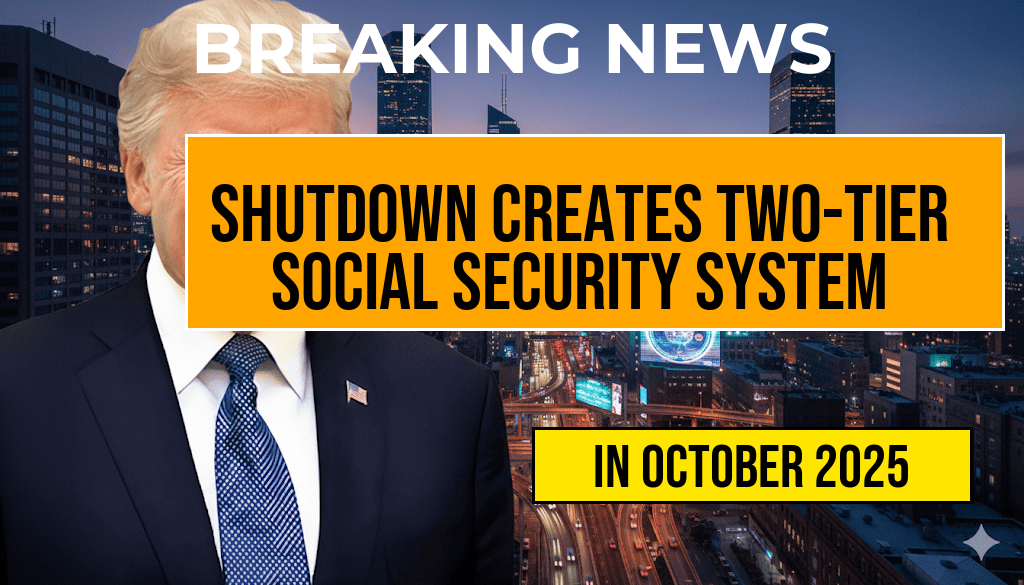The recent government shutdown has resulted in a stark divide within the social safety net, creating a two-tier system that benefits current Social Security recipients while halting new applications entirely. While those already collecting benefits continue to receive their payments without interruption, prospective beneficiaries face an indefinite suspension of their claims, leaving thousands in limbo. This split reflects broader issues stemming from budget disagreements in Congress, which have led to partial government operations and disrupted services across multiple federal agencies.
Impact of the Shutdown on Social Security Operations
Since the shutdown commenced, the Social Security Administration (SSA) has maintained the disbursement of benefits to existing recipients, citing statutory obligations to ensure ongoing payments. However, the agency has largely suspended processing new applications and reinstatements, citing staffing shortages and limited operational capacity. This means that individuals applying for their first Social Security check or requesting modifications to their existing benefits face indefinite delays.
The agency’s decision aligns with the broader federal response to the shutdown, which has prioritized essential services while restricting non-urgent activities. According to SSA officials, the agency continues to process and issue payments for current beneficiaries but cannot accept or process new claims until appropriations are restored.
Effects on Prospective Beneficiaries and the Broader Community
Prospective Social Security applicants include retirees, disabled workers, survivors, and individuals seeking Supplemental Security Income (SSI). With the application process effectively frozen, many face uncertainty about when their claims will be reviewed or approved. This has immediate financial implications for those who rely on Social Security as their primary income source, especially as the shutdown overlaps with the start of the new fiscal year when many submit new claims.
Advocacy groups warn that the delay could exacerbate economic hardships for vulnerable populations. “When the government halts processing new applications, it undermines the very purpose of Social Security as a safety net,” said National Academy of Social Insurance spokesperson. “People depend on timely benefits, particularly during economic downturns, and delays threaten their financial stability.”
Legal and Political Context of the Shutdown
The shutdown stems from political disagreements over federal funding, with lawmakers unable to reach an agreement on appropriations bills. The impasse has led to a partial government closure, affecting various agencies, including the SSA. While some essential functions continue, many non-essential services are suspended or severely limited.
Senators and Representatives are engaged in ongoing negotiations, but the stalemate has left thousands of federal employees furloughed and public services disrupted. The shutdown, now entering its third week, has prompted calls from both parties to negotiate a resolution, though political factions remain divided over funding priorities.
Historical Perspective and Potential Repercussions
Historically, government shutdowns have resulted in similar disruptions, but the current situation underscores the long-term consequences of political gridlock. The creation of a two-tier system within Social Security exemplifies how policy disagreements can produce unequal access to essential services.
Experts warn that if the shutdown persists, the backlog of unprocessed claims could grow, leading to increased administrative costs and further delays once operations resume. Additionally, the uncertainty may erode public confidence in the federal safety net, especially among those who have yet to initiate claims.
Key Data and Implications for Future Policy
| Aspect | Pre-Shutdown Status | Current Status | Implications |
|---|---|---|---|
| Existing Beneficiaries | Payments processed regularly | Payments continue without interruption | Financial stability maintained for current recipients |
| New Applications | Processing ongoing with some delays | Processing halted entirely | Potential financial hardship for applicants |
| Reinstatements & Changes | Normal processing | Suspended | Inability to update or correct benefits |
This division highlights vulnerabilities in the social support framework, especially during political crises. Experts suggest that future policy reforms should aim to create more resilient systems capable of functioning during government impasses.
Looking Ahead: Potential Resolutions and Policy Considerations
As negotiations continue, the Biden administration has urged Congress to pass a short-term funding measure to restore full government operations. Lawmakers face pressure to resolve the impasse quickly, not only to resume processing of new Social Security claims but also to stabilize the broader federal apparatus.
Meanwhile, stakeholders emphasize the importance of safeguarding the integrity of the social safety net. “A government shutdown should never create a two-tier system where some Americans are protected while others are left waiting,” said Forbes contributor Joe Walsh. “Legislators need to prioritize essential services and ensure that vulnerable populations are not caught in political crossfire.”
As the political deadlock continues, those relying on Social Security and related benefits watch closely, hoping for swift congressional action to restore full functionality and prevent further disruption.
Frequently Asked Questions
What is the impact of the government shutdown on existing Social Security recipients?
Existing Social Security recipients remain protected during the government shutdown, continuing to receive their benefits without interruption.
How does the government shutdown affect new Social Security applicants?
New Social Security applicants face a complete halt in processing and benefits, creating a two-tier system where only current beneficiaries are protected.
Why are new Social Security applications halted during the shutdown?
The shutdown leads to the suspension of certain government services, including the processing of new Social Security applications, due to limited staffing and funding.
Will there be any changes to Social Security benefits for existing recipients during the shutdown?
No, existing Social Security recipients will continue to receive their benefits as usual, unaffected by the shutdown.
What are the long-term implications of this two-tier system for Social Security?
The two-tier system may create disparities between current and future beneficiaries, raising concerns about the fairness and sustainability of Social Security during prolonged shutdowns.

Leave a Reply